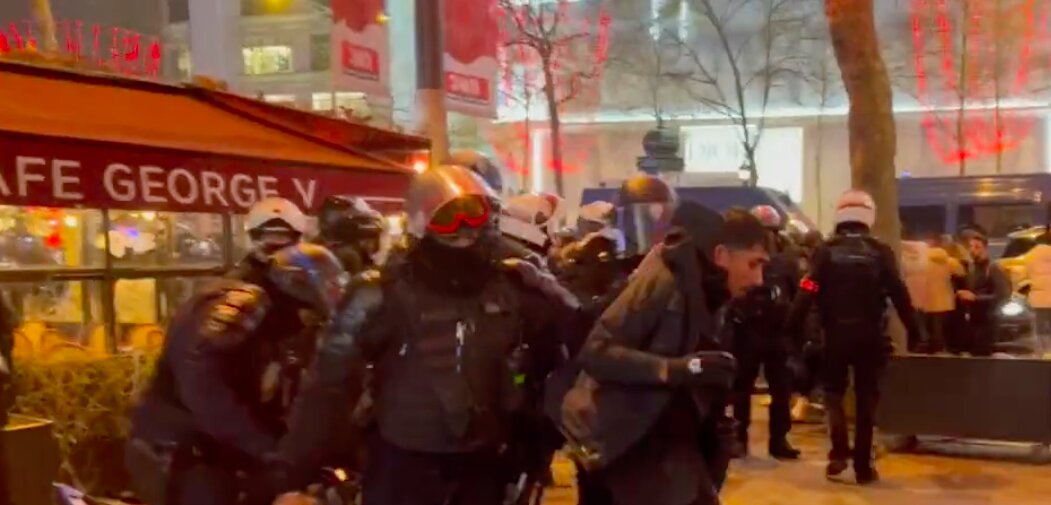The decision has been described as “racist” and comes amid a series of anti-Arab and anti-Muslim orders passed by the government.
Clashes between French police and supporters from a number of Arab countries playing on the last day of the 2021 FIFA Arab Cup erupted on Saturday night following a ban on gatherings at the Champs Elysées.
Supporters of “football teams from Algeria, Egypt, Qatar and Tunisia or those behaving as such” were banned from the landmark site from 18 December at 11:00am until 19 December at 6am, per an order issued by the Paris Police Prefecture on Friday.
Authorities had set up a security perimeter in the area and issued 432 violations, including 32 arrests on the Champs Elysees by Sunday as violent clashes were seen on the streets.
Le préfet de Police prend un arrêté instaurant un périmètre de sécurité dans le secteur des #ChampsElysées à l'occasion de la finale la #FIFArabCup ce samedi 18 décembre.
Plus d'informations 👇 pic.twitter.com/rJEWIoldvG
— Préfecture de Police (@prefpolice) December 16, 2021
While the decision was justified by French authorities as an attempt to “ensure the safety of traders, residents and walkers in full shopping season for the holiday season”, analysts slammed it as “racist”.
Speaking to Doha News, Rayan Freschi, researcher at London-based advocacy organisation CAGE, said the ban was “a natural consequence of the massive Islamophobic securitisation of Muslims by the French State”.
“Their [Muslims] presence is constantly regarded as a potential source of violence. This securitisation is itself a consequence of the historical systemic islamophobia which only deepens with the passing of time,” said Freschi.
The CAGE researcher said the ban also builds up and reinforces an ongoing islamophobic narrative in France even at times of celebration.
“This ban is the latest in a long list: an important pro-Palestine protest was banned back in May. If the context was different [a purely political protest back then, an expression of joy after a football cup now], the underlying reasoning remains the same,” added Freschi.
French police went on to say in their latest statement that the decision came “following the overflows” during previous matches in which “many football fans gathered on the avenue des Champs Elysées, invading the traffic lanes and sending projectiles, smoke and mortars in the direction of the police”.
Nevertheless, Freschi said the ban only reflects France’s “historical willingness to ban the presence of its Muslim minority” from areas like the Champs Elysées.
“A Muslim presence —whether it is Algerian, Tunisian, Qatari or Egyptian—is seen as a blemish to the Frenchness of these places, a blemish which cannot be tolerated,” said Freschi.
France has a high population of Tunisians and Algerians, with tens of thousands migrating to the European country after decades of French colonisation.
French-Algerians are considered to be the largest minority in France.
Read also: Dip in French exports to Qatar linked to mass boycott movement
Per 2019 statistics from the French Institute for Demographic Studies [INED], immigrants represent 13% of the total French population. However, this is under the UN’s definition immigrants, which applies to people born outside of France.
In 2018, the INED found that half of France’s immigrants come from seven countries, including Algeria [13%]; Morocco [11.9%]; Portugal [9.2%]; Tunisia [4.4%]; Italy [4.3%]; Turkey [3.8%]; and Spain [3.7%].
French islamophobia
France has long faced public scrutiny for its anti-Arab and islamophobic sentiment.
Late last year, the resurfacing of offensive Charlie Hebdo cartoons of the Prophet Muhammad sparked controversy worldwide.
This led to an abhorrent incident in which a teacher in France was killed for showing his class the cartoons. France responded by clamping down on “extremism” with a large-scale crackdown on Islamic entities in the country, raiding more than 50 mosques and associations.
French President Emmanuel Macron also said Islam was a religion “in crisis” worldwide and affirmed France would “not give up cartoons,” triggering global controversy. This sparked mass action and virtual campaigns condemning France’s islamophobia, including calls for a boycott of French products under a popular #BoycottFrance movement.
Protesters at the time also took to the streets in capitals around the world to denounce the provocations.
Last year, Qatari residents and citizens called to replace French goods with Turkish products, with the Gulf state’s flagship Al Meera supermarket removing French products from its shelves.
According to a report by the International Trade Centre, French exports to Qatar took a massive hit with a 59% decrease. The value of sales to Qatar dropped from $4.2 million in 2019 to $1.7 million in 2020.
Follow Doha News on Twitter, Instagram, Facebook and Youtube







